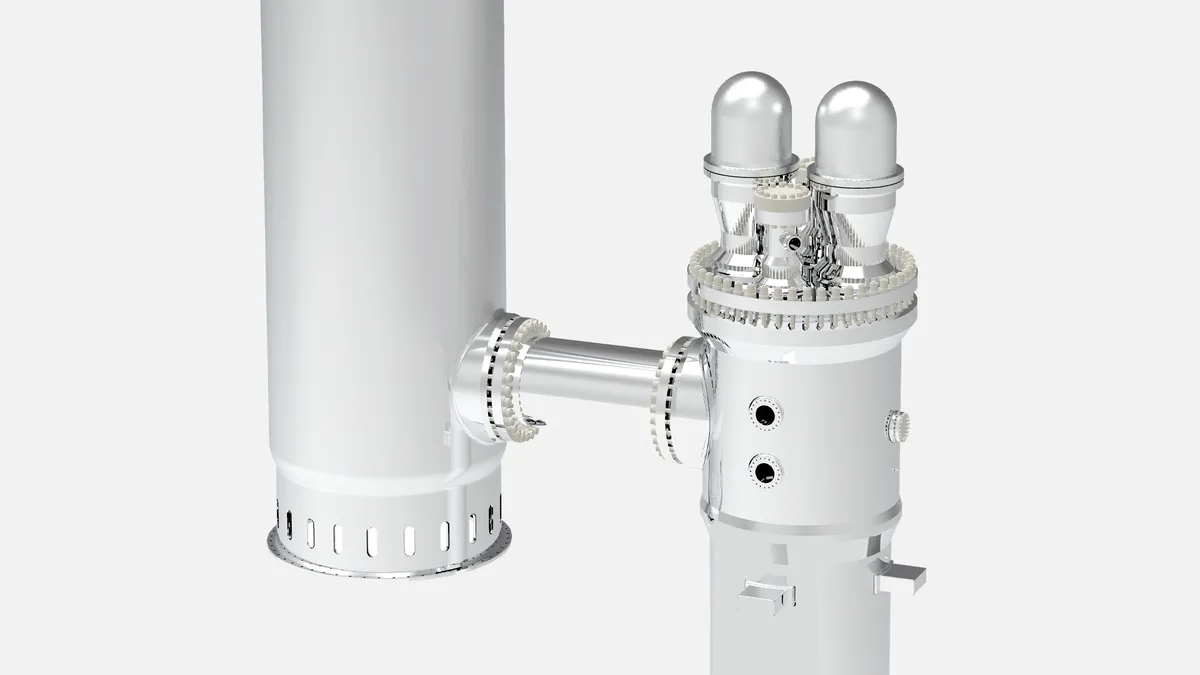Dive Brief:
- The partner in a merger with a small modular nuclear reactor developer going public has cautioned investors that changing markets and a “limited operating history” may ultimately be unfavorable to the business.
- Ares Acquisition Corp., a special purpose acquisition company, warned in an S-4 filing with the U.S. Securities and Exchange Commission Wednesday of “limited operating experience for reactors of this type, configuration and scale” that could lead to higher than expected construction costs, maintenance requirements, operating expenses or changes in the timing of delivery. X Energy Reactor Co. announced the merger in December.
- The market for SMRs generating electric power and high-temperature heat is not yet established and “may not achieve the growth potential we expect or may grow more slowly than expected,” Ares said. It’s backed by private equity firm Ares Management Corp.
Dive Insight:
The S-4 filing, which provides a preliminary proxy statement and spells out details of the renamed X-Energy business and market risks, provides boilerplate cautions to investors who require transparency and discussion of as many potential risks as possible. It highlights challenges in a still-emerging industry. The U.S. Nuclear Regulatory Commission on Jan. 19 certified NuScale Power’s SMR design, the first of its type to win federal approval.
Ares said it expects X-energy will yield about $2 billion in revenue from 2023 through 2027 under the U.S. Department of Energy’s Advanced Reactor Demonstration Program, or ARDP. Of that, about $1.2 billion would be from the federal government and the remainder “assumed to come from X-energy’s utility or other designated partner in the ARDP program,” Ares said.
Terms of the cost-sharing agreement are being negotiated and may change, it said.
The companies expect the first commercial delivery of one of their SMRs in 2029, but the start of construction depends on finalizing the design, producing fuel and receiving permits from the NRC.
“Our team of approximately 400 engineers, scientists and other staff is highly motivated and committed to accomplishing these challenges ahead,” Ares said. “Failure to complete any one of these tasks in a timely manner could result in us being unable to begin production in the anticipated timeframe.”
Ares said the market for SMRs, and particularly for SMRs using advanced nuclear technologies such as those employed in the Xe-100 — an 80 MWe reactor that can be scaled into a ‘four-pack’ 320 MWe power plant — has not yet been established. SMRs using advanced nuclear technologies have not been proven at scale, it said.
Its estimates for the “total addressable market” and expectations of certain unit economics for SMRs are based on internal and third-party estimates, it said. Ares said it factored in potential contracted revenue, the number of potential customers who have expressed interest in its SMRs and assumed prices and production costs.
“However, our assumptions and the data underlying our estimates may not be correct and the conditions supporting our assumptions or estimates may change at any time,” it said.
Ares also warned that it may not attract customers for its SMR technology — a “relatively new and unproven technology” — as quickly as it expects, “or at all,” and acquiring customers may be more expensive than it currently anticipates.
In addition, Ares said the time and funding needed to bring X-energy’s nuclear fuel, TRISO-X, to market at scale may “greatly exceed” expectations.
“Any shortfall in research, development and testing funds, any delay in achieving fuel development milestones, uncertainty in regulatory licensing timelines or adverse public reaction to developments in the use of nuclear power by special interest groups, community groups and state and local government agencies leading to environmental litigation or other legal proceedings could result in significant delays and cost overruns and could adversely affect our ability to deploy, and our customers to operate, the Xe-100” Ares said.
Critics of SMRs have raised issues nearly identical to what Ares cited, calling out the reactors over the projected cost and time needed for siting and other approvals.
“Small modular reactors may be viable one day, but they are not today, will not be tomorrow and may never make as much economic sense as renewable sources of electricity,” the Institute for Energy Economics and Financial Analysis says. “We should stick to carbon-free energy sources that make financial and environmental sense.”
The Xe-100 will initially be entirely dependent on X-energy’s TRISO-X fuel for operations, Ares said. If it’s unable to access High-Assay Low-Enriched Uranium, its ability to manufacture TRISO-X fuel will be adversely affected. Russia has been a significant global supplier of HALEU, but because of its invasion of Ukraine and resulting global sanctions, “we are highly dependent on the U.S. government for access to HALEU,” Ares said.















